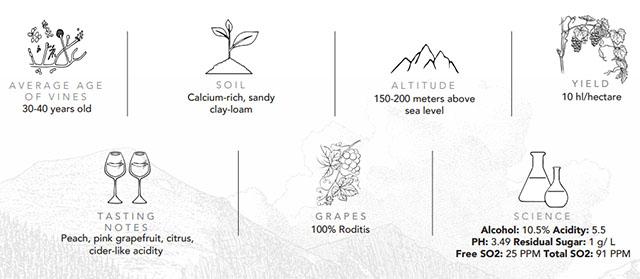Rodi Rosé
In the spirit of pairing progress with tradition, our team set out to source a wine made in an ancient style, with a modern twist.
In the spirit of pairing progress with tradition, our team set out to source a wine made in an ancient style, with a modern twist.
ABOUT THIS SPECIAL RELEASE
Before pushing boundaries in sustainable packaging, Archer Roose Co-Founder David Waldman was a Co-Founder of Pheasant's Tears, a Georgian producer and leader in the natural wine movement. David was among the first to sell skin-contact and amber wines in the United States. In the spirit of pairing progress with tradition, our team set out to source a wine made in this ancient style, with a modern twist. With Thomas Anastou, we landed on a skin-contact Roditis from Greece, and we packed it in planet-friendly cans and kegs.
ABOUT THE WINEMAKER
Thomas Anastou’s relationship with wine began with a collection of poems written over 900 years ago by the “Poet of Wine” Omar Khayyam. These days, Thomas has spent half his life working in wine. After serving in the Greek navy, he earned a scholarship to attend National Metsovio Polytechnic, where he graduated with a Bachelor of Science in Enology and Beverage Technology and was first in his class. A Thessaloniki native, Thomas specializes in wines made in and around Naoussa, Greece.
VITICULTURE & SOIL
Our Roditis grapes are grown in the ‘pola nera’ region, the northern part of the PDO appellation of Naoussa. The vineyard soils are rich in calcium and clay deposits, with high water permeability and structure, allowing for a more integrated grapevine root system. Naoussa is marked by a continental climate, and our Roditis vineyards are nestled among ancient ruins at the foot of the Vermio Mountains, between 150-200 meters above sea level.
HARVEST 2019
Despite a challenging winter, with excessive cold and snow, this year’s harvest was dubbed “the best vintage in two decades.” This assessment was echoed by the renowned, neighboring Naoussa producer Kir Yianni. Heavy rainfall in the spring meant a delayed ripening of the grapes, but constant attention and care on the vineyard protected the grapes from frost and mildew. The grapes were harvested by hand in early October.
WINEMAKING
This wine was wild-fermented in stainless steel tanks with native yeasts, at a temperature between 21-23 C. There was no grape pressing, the wine is 100% free-run juice. Skin contact lasted 10 days. The additives used during vinification were a low dose of sulfur dioxide and antioxidant tannins. The wine was aged on its lees with "bâtonnage" for 5 weeks.
